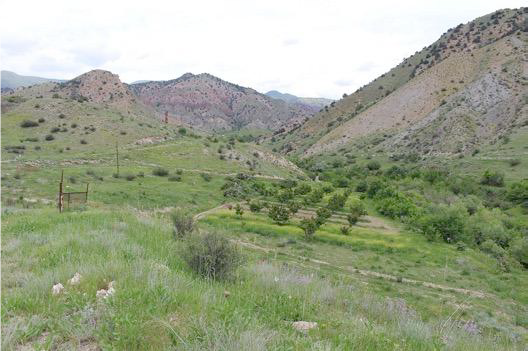Due to its climate and pronounced location in the South Caucasus with a mountainous landscape, fragile ecosystems and a vulnerable, agricultural based economy, the compounding effects of climate change and land degradation particularly affect livelihoods and economies of Armenia and its approximately 3 million inhabitants. In fact, climate trends over the previous 90 years have already indicated a significant warming trend. The summer season has become dryer and the number of extreme events, like hailstorms, has increased. Different climate change scenarios predict that this trend will continue to increase and substantially affect the marginal production areas. Crop and livestock production have already decreased in some areas, and if no additional climate adaptation measures were taken, will continue to decrease.
Notably areas and communities adjacent to protected areas and forests – like Khosrov Forest State Reserve and Dilijan National Park – are vulnerable due to a persistent pressure on the remaining land and pasture resources, weak rural infrastructure and the lack of alternative income opportunities. The existing capacity to adapt to a changing climate and its increasing impacts on the rural livelihoods and their production systems is low, calling for concerted efforts to addresses the compounding challenges of land degradation and climate change impacts on rural livelihoods.
The objective of the project is to reduce the climate risk vulnerability of local communities living adjacent to the “Khosrov Forest” and “Dilijan” National Park by strengthening the adaptive capacity of the agricultural sector and reinforcing their institutional and planning capacity for climate change adaptation.
The specific objectives of the project are:
- Community based, climate smart agricultural practices implemented in degraded areas to reduce climate risks vulnerability of production systems and sustain protected areas.
- Value chains for climate smart agriculture strengthened and climate smart technologies made accessible for vulnerable rural communities, including equally for women and men.
- Awareness, planning, monitoring and decision-making capacity on climate smart agriculture production methods and land degradation neutrality in target communities.
| Project Component 1: Community based, climate smart agricultural practices in degraded areas and buffer zones | US$ 1,733,183 |
| Project Component 2: Strengthening value chains and climate smart technology transfer for vulnerable communities | US$ 342,397 |
| Project Component 3: Awareness raising, capacity building, monitoring and decision making for climate smart agricultural practices | US$ 200,000 |
| Project Execution Cost | US$ 34,130 |
| Total Project Cost | US$ 2,309,710 |
| Implementing Entity Project Cycle Management Fee | US$ 196,290 |
| Grant Amount | USD 2,506,000 |
Project Documents
| Attachment | Type | Size |
|---|---|---|
| Project concept | 1 MB | |
| Project document | 7 MB | |
| Inception Report | 5 MB | |
| PPR1 (for web) | XLS | 337 KB |
| PPR2 (for web) | XLS | 451 KB |
| Mid-term evaluation report | 1 MB | |
| PPR3 (for web) | XLS | |
| Final evaluation report | 8 MB | |
| Project completion report | 440 KB |



